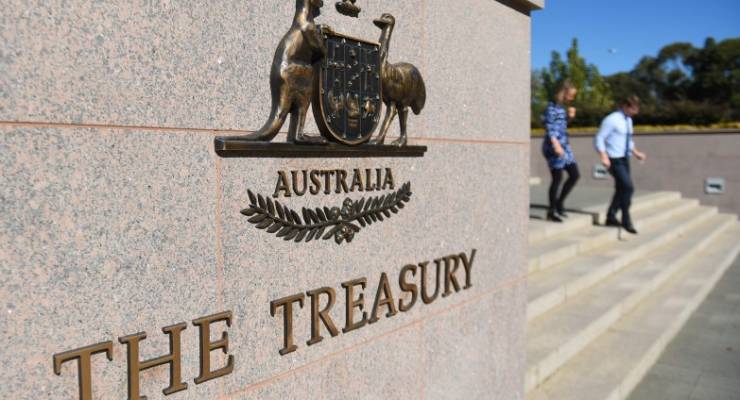
Whether it’s an abiding fear Labor will sack him if elected, or if he’s genuinely unsure what economic direction his former boss Scott Morrison is going to go in, Phil Gaetjens’ first speech as Treasury Secretary, delivered in Perth yesterday, was a strictly by-the-numbers effort.
Since Gaetjens became Treasury head — a post to which he should never have been appointed — the government has lurched further into major economic interventionism, abandoned its company tax cuts, reversed its energy supplement decision and abandoned the energy policy it had worked on for a year. Since becoming Prime Minister, Scott Morrison has flirted with a royal commission into energy and, today, ditched a crucial part of Australia’s long-term retirement incomes policy, the lifting of the retirement age to 70. As a core part of the neoliberal consensus in Australian policymaking during the Howard years, Gaetjens now looks increasingly isolated even from the party for which he worked so long.
In that context, a full-blooded embrace of economic reform and a bold vision for a more efficient economy would have rung hollow at best and at worst embarrassed a government now more focused on saving the furniture than overhauling the economy. Nor is it clear exactly what the so far invisible Josh Frydenberg plans to do as Treasurer, beyond — we assume — prepare a mini-budget or economic statement instead of MYEFO for December, under the careful guidance of Mathias Cormann.
In that context, what Gaetjens omitted from his speech was more salient than a recitation of how well the global and domestic economy was travelling. There was not a single mention of wages beyond reporting that mining companies in the Pilbara had reported wage pressures in some roles. Otherwise, the most important issue facing the economy is apparently not worth the attention of the Treasury Secretary, despite the issue being of sufficient concern to the Reserve Bank for governor Philip Lowe to warn it will undermine the chances of economic reform, despite the impact on consumer spending, despite the role it plays in alienating voters from politics because of the perception that the economy is working in the interests of the powerful and corporations, not workers.
It’s unsurprising that Gaetjens fails to mention two of the other major economic policy challenges Australia faces — climate change and energy. The Coalition’s absence of coherent policy on either, and the red-hot political status of the issues within the Liberal Party, would rule out anything other than the most anodyne reference by a public servant. But it is in the demonstrable self-interest of the government, and its business allies, to signal to voters that it gets the wage stagnation issue and is engaged with addressing it. Instead, all we get is the whine of mining companies that they might have to pay more to hire specialist skills.
Out of touch and, perhaps, out of time.









Heard Frydenburg on the radio this morning. When confronted with the fact that savings are falling he said that this showed how people were so confident in the economy that they are spending their savings in anticipation of replenishing them from earnings. Has he not heard of marginal propensity to save and that it is higher amongst those with more money than they need? The man is no better than the fool who took over from.
He’s got the common touch? He’s Joshin’ us.
Every action of this current shower impels me to think, “oh well, not much longer”.
But then I look at the alternative.
Which is preferable, cholera or typhoid?
About the silence on both climate policy and energy policy…
Climate policy requires us to plan to replace and then stamp out all use of natural gas by 2050 or so. In direct conflict, energy policy, backed in unison by Right, Conservative, Left and far Green, requires the urgent and rapid development of our vast “natural gas” resources. All interests want 100 years of infrastructure and export terminals developed as soon as possible so it cannot be delayed by pussyfooted boffins talking about the greenhouse. None of those interests want to leave any fingerprints on those decisions, because there will be a Day of Judgement when our survivors challenge those of us still living to explain what we did to avert disaster while we had the chance. Then all of us will be acting dumb, as each pretends we had nothing to do with it. In the meantime we will have profited one way or another from massive exports and the availability of copious, cheap, reliable, “clean”… Gas. Youngsters, that stuff is methane, so write it down now alongside the decade that we failed to act.
True enough Roger, but the best option for reducing greenhouse emissions was always to get out of coal completely by installing gas powered generation along with renewables with the intention of decommissioning the gas generation as and when renewables could cover the entirety of our electrical needs.
Of course we could have just gone straight to renewables only, starting years ago. The technology has been around, just not supported.
A particular problem has been obfuscators going on about baseload issues to carry their pet nuclear generation arguments, something that is politically impossible with no actual demonstrated examples and plenty that never get finished and blow out multiples of their budget, while all the while not addressing problems about the fact that the emissions in concrete production in nuclear were never going to be repaid.
Future generations will curse us but not because we didn’t go the nuclear option.
We will be remembered for our emissions, not for our reductions.
So glad those miners in pilbara are exerting wage pressures in some professions. That should fix everything.
We will be remembered for our emissions, not for our reductions.